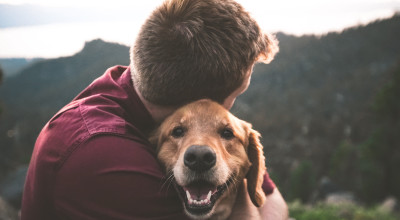8 Ways That Dogs Help in Addiction Recovery
January 29th, 2019
Windmill Wellness Ranch is a dog-friendly facility for a reason. Medical professionals have long used dogs and other animals as companions for various recovery and rehabilitation programs. In fact, Florence Nightingale noted the benefits of animal companionship for her patients back in 1860.
Many people understand how a dog’s presence can brighten a sad day or help distract a preoccupied mind. Significant research shows that not only do dogs have a positive effect on mental health overall, these furry friends are especially positive in addiction recovery. From easing relapse symptoms to providing a consistent support system throughout the recovery journey, dogs have a lot to offer to people addicted to drugs and alcohol.
Dogs Stimulate Positive Neurotransmitters
Interacting with a dog helps boost necessary neurotransmitters such as dopamine, serotonin, and oxytocin. All three of these brain chemicals are necessary for healthy brain development and a positive outlook on life. In fact, dopamine is the mood-elevating neurotransmitter, serotonin controls feelings of happiness, and oxytocin is known as the “love hormone.”
People often seek these feelings of happiness and euphoria when they abuse drugs and alcohol. The unconditional affection of a dog allows for them to achieve these feelings naturally and in a positive manner. Healthy stimulation of these chemicals is a major step towards recovery.
Dogs Provide Safe, Familiar Comfort
When someone visits a rehabilitation facility to detox from drugs and alcohol, the process can be overwhelming and scary. In order for a program to be effective, the person will need to stay away from certain substances and people, such as drugs, alcohol, and people who pressure him or her into using drugs and alcohol. However, he or she will also not have regular access to familiar home comforts, such as cell phones, computers, and people in his or her daily life. This can make someone feel extremely lonely and anxious.
At Windmill Wellness Ranch, clients can bring their own animals and keep them with them throughout their stay. Their dogs provide a safe, loving support system and a piece of home while they continue through our recovery program.
Dogs Provide Regular Exercise
When a person cares for a dog, he or she must take it out on regular walks and play with it outdoors. Many research publications show that people who own dogs get more exercise due to the nature of their care – and exercise is a crucial part of addiction recovery. Like dogs themselves, exercise stimulates positive neurotransmitters in the brain. Even if a person is not exercising for long periods of time with his or her dog, spending time outdoors can also improve mood and emotion, aiding in recovery.
Dogs Reduce Stress and Aid in Relaxation
Research shows that owning a dog reduces cortisol levels, also known as the stress hormone. Stress is an extremely important factor that people in addiction recovery need to manage, since stress often leads to substance cravings and triggers relapses. Spending time with dogs can significantly lower a person’s stress levels, decreasing his or her risk of relapse and pain during recovery.
In addition, spending time with a dog can aid in relaxation. The rhythmic nature of petting a dog over and over again is calming and can help lower blood pressure. Interacting with dogs also lowers anxiety, which can help put a person in recovery’s mind at ease and help him or her relax.
Dogs Provide Unconditional Love and Trust
Dogs are a wonderful source of love and trust, forming strong bonds with their owners. Bonding with another creature and creating and sustaining a strong flow of love can help increase feelings of happiness and boost a person’s mental health. If a person’s substance abuse led him or her to feel isolated or estranged from loved ones, a dog can help fulfill the missing need for unconditional love.
Dogs do not judge their owners, they do not criticize, and they always accept their owners for who they are. Dogs can help a person in recovery rebuild his or her self-esteem if substance abuse harmed this aspect of his or her life.
Dogs Allow for the Development of Life Skills
Taking care of a dog requires a certain level of accountability and responsibility. Dogs help their owners learn crucial life skills, such as taking them on daily walks and feeding them on a regular schedule. Often, substance abuse completely throws a person’s schedule out of whack and without any responsibilities, he or she can fall down a hole of using and recovery. Dogs can provide a sense of responsibility for someone in recovery, keeping him or her away from drugs and alcohol when the temptation arises.
Dogs Help People Learn About Themselves
Dogs are unconditional with their love and are completely honest with their owners. If a dog feels sad, angry, scared, happy, or tense, the owner will be able to tell. This can be a welcome relief from the way humans often hide their emotions from others. Dogs, especially, reflect the emotions that their owners are feeling, which can help the owner identify and assess his or her emotions in a safe manner.
In addition, dogs help clinicians learn more about their patients. Introducing a dog into a therapy session, for example, can help clinicians determine how their clients interact in actual interpersonal relationships. In addition, watching a person interact with his or her pet can help a clinician assess a client’s emotions and responses, which are crucial in developing a proper treatment program.
Dogs Help Facilitate Other Relationships
When a person enters rehabilitation, he or she will often leave a lot of people behind. People in recovery need to cut poor influences, old drinking buddies, toxic and abusive family members, and friends who still use drugs out of their lives to ensure a successful recovery. As a result, they need to build new relationships.
Dogs provide a starting point for new relationships, since forming a bond with a dog is less stressful and easier than forming one with a human. In addition, owning a dog helps get a person out of the house and into new situations where he or she can meet other dog owners. Dogs are also a great conversation starter, and can give their owner something positive in their life to discuss with others.
Do you or a loved one need a holistic, dog-friendly recovery program? Contact Windmill Wellness Ranch today to learn more about our Canyon Lake facility and how to enroll.


